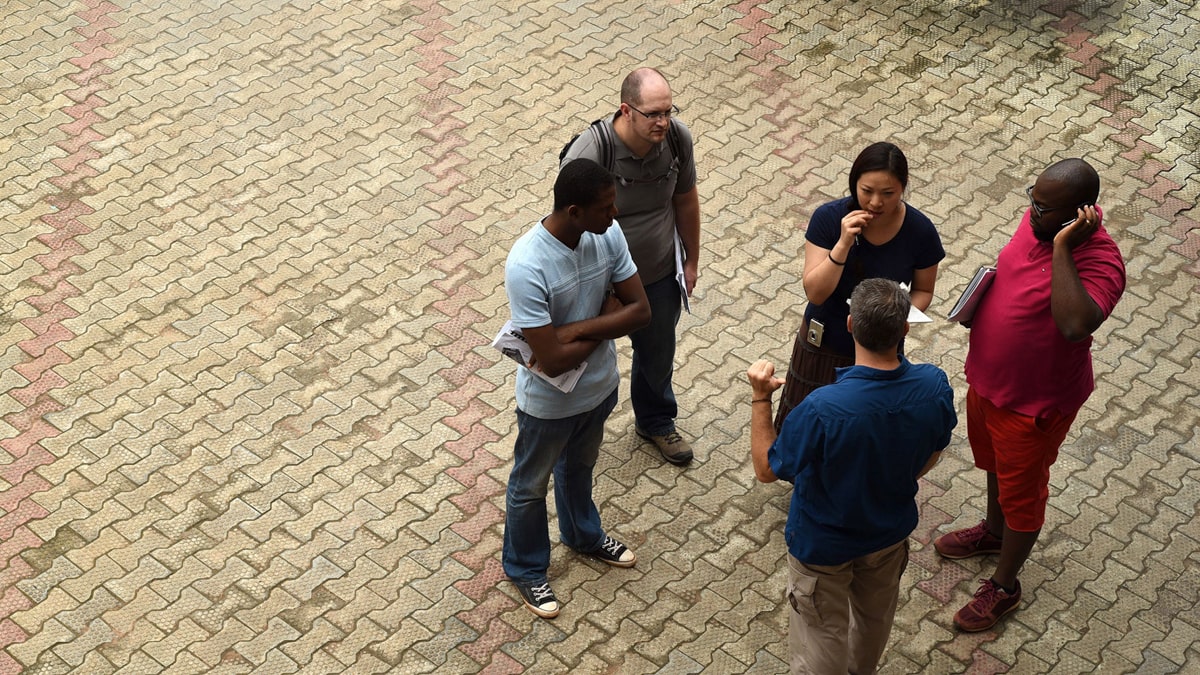
Latin America March 2021 Field Report
April 26, 2021
From Fog to Clarity: Coaching, eMi, and GTP
May 27, 2021Filling Empty Board Positions
How did the early church select an overseer to fill an empty board spot?
Most answer this question by pointing to the qualifications lists of 1 Timothy 3:1–7 or Titus 1:5–10. While these texts list character traits to look for in board candidates, consider another text to stimulate your thinking on how the selection process actually worked. When Judas left an open spot on the governing body of the early church, Acts 1:21–26 reveals a two-part process for filling his vacancy. It offers fresh insights for us today.
21 Therefore it is necessary to choose one of the men who have been with us the whole time the Lord Jesus was living among us, 22 beginning from John’s baptism to the time when Jesus was taken up from us. For one of these must become a witness with us of his resurrection.” 23 So they nominated two men: Joseph called Barsabbas (also known as Justus) and Matthias. 24 Then they prayed, “Lord, you know everyone’s heart. Show us which of these two you have chosen 25 to take over this apostolic ministry, which Judas left to go where he belongs.” 26 Then they cast lots, and the lot fell to Matthias; so he was added to the eleven apostles.
Notice the two parts of the selection process. One reflects the human role, and the other reveals God’s part in guiding the process. For the eleven, they looked for a person known to them who had been with the Lord Jesus from the beginning. Two candidates met these criteria: Barsabbas and Matthias. For God’s part, the eleven cast lots to allow God to show them who of the two would serve as the final member of the twelve.
Have you ever seen a board selection process that was unclear or appeared to be rigged? This is not about loaded dice or a coin with two heads, but rather a selection process that was vaguely outlined and, as a result, was ripe for abuse and exploitation! In contrast, think about this New Testament illustration regarding the selection of Matthias. Because the disciples cast lots, no one could say this process was manipulated.
In the ancient world of the Scriptures, in the days of both the Old and New Testaments, people believed the gods had sway over the affairs of humankind. It was actually quite common to cast lots to interface with the gods or with the one true God. We find a memorable example of this related to God in Jonah 1:4–7.
4 Then the Lord sent a great wind on the sea, and such a violent storm arose that the ship threatened to break up. 5 All the sailors were afraid and each cried out to his own god. And they threw the cargo into the sea to lighten the ship. But Jonah had gone below deck, where he lay down and fell into a deep sleep. 6 The captain went to him and said, “How can you sleep? Get up and call on your god! Maybe he will take notice of us so that we will not perish.” 7 Then the sailors said to each other, “Come, let us cast lots to find out who is responsible for this calamity.” They cast lots and the lot fell on Jonah.
Back in the case of the eleven and the filling of the empty position of Judas, the lot fell on Matthias. We know little about Matthias, but Hippolytus of Rome provides one important clue (c. A.D. 235). In his work, On the Twelve Apostles: Where Each of Them Preached, and Where He Met His End, Hippolytus mentions “Matthias, who was one of the seventy.” The seventy appear in Luke 10:1–12 as followers personally sent out on mission by the Lord Jesus.
Who was Hippolytus of Rome? Ancient sources report that he was a disciple of Irenaeus, who was a disciple of Polycarp, who was a disciple of John, who numbered among the twelve. This ancient external testimony of Hippolytus corroborates the biblical evidence. This candidate Matthias indeed met the selection criteria.
The selection process that identified Matthias in Acts 1 suggests that the eleven abstained from the cultural pattern of choosing overseers based on wealth, status, and/or lineage. Instead, they adopted a process for locating at least two qualified candidates. Also, we see them employ an intentional practice to get their opinions or bias out of the way so that God could make the final choice from among two candidates that surfaced.
Don’t hear this as prescriptively suggesting that every board casts lots to choose between two viable candidates, though I know of boards that follow that biblical pattern. Hear this descriptively urging you to outline a process that hinders people from manipulating the outcome. Boards do well to structure the identification processes carefully in order to locate candidates with Christian maturity and demonstrated gifting. And they also do well to guard the selection process to avoid scheming and exploitation. Why?
Churches and ministries need board members who are not focused on their own agendas or selfish gain like Judas but willing to give their lives to advance God’s work like the eleven. Locating such candidates is challenging, so thankfully the New Testament gives us this two-part model for filling empty board positions.
––––
This article was adapted from the Christian Leadership Alliance Blog on 17 April 2019. For more insights on this topic, check out the Template Training Tuesday recording of “Board Matrix and Board Selection Process and Interview Template.”
Llenar posiciones vacantes en la Junta Directiva
¿Cómo la iglesia primitiva seleccionó a un supervisor para llenar un espacio vacío en la junta directiva?
La mayoría responde esta pregunta señalando a la lista de calificaciones de 1 Timoteo 3:1-7 o de Tito 1:5-10. Mientras estos textos enlistan rasgos de carácter a buscar en los candidatos para la junta directiva, considere otro texto para estimular su pensamiento sobre cómo el proceso de selección funcionaba realmente. Cuando Judas dejó una vacante en el órgano directivo de la iglesia, Hechos 1:21-26 revela un proceso de dos partes para llenar su vacante. Este ofrece una perspectiva nueva para nosotros en la actualidad.
Por tanto, es preciso que se una a nosotros uno de los que nos acompañaban todo el tiempo que el Señor Jesús vivió entre nosotros, desde que Juan bautizaba hasta el día en que Jesús fue tomado de entre nosotros y recibido en las alturas. Es necesario que uno de ellos sea junto a nosotros testigo de la resurrección». Así que propusieron a dos: a José, llamado Barsabás, apodado el Justo, y a Matías. Y oraron así: «Señor, tú que conoces el corazón de todos, muéstranos a cuál de estos dos has elegido para que se haga cargo del servicio apostólico que Judas dejó para irse al lugar que le correspondía». Luego echaron suertes y la elección recayó en Matías; así que él fue reconocido junto con los once apóstoles.
Note las dos partes del proceso de selección. Una refleja el rol del ser humano, y la otro revela el papel de Dios en guiar ese proceso. Para los once, buscaron una persona conocida por ellos quien hubiera estado con el Señor Jesús desde el principio. Dos candidatos cumplían estos requisitos: Barsabás y Matías. Para la parte de Dios, los once echaron suertes para permitir que Dios les mostrara quién de los dos serviría como el último miembro de los doce.
¿Alguna vez ha visto un proceso de selección que fuera confuso o que pareciera ser fraudulento? No se trata de dados cargados o de dos caras de una moneda, sino de un proceso de selección que estaba vagamente perfilado y que, en consecuencia, ¡se prestaba a abusos y explotación! En cambio, piense en esta ilustración del Nuevo Testamento sobre la selección de Matías. Ya que los discípulos echaron suertes, nadie podría decir que este proceso fue manipulado.
En el antiguo mundo de las Escrituras, en los días del Antiguo y Nuevo testamento, las personas creían que los dioses tenían dominio sobre los asuntos de la humanidad. En realidad era bastante común echar suertes para interactuar con los dioses o con el único Dios verdadero. Encontramos un ejemplo memorable de esto relacionado con Dios en Jonás 1:4-7.
Pero el Señor lanzó sobre el mar un fuerte viento y se desencadenó una tormenta tan violenta que el barco amenazaba con hacerse pedazos. Todos los marineros tenían miedo y cada uno clamaba a su dios. Y arrojaron el cargamento al mar para aligerar el barco. Jonás, en cambio, había bajado al fondo de la nave para acostarse y dormía profundamente. El capitán del barco se le acercó y dijo: —¿Cómo puedes estar durmiendo? ¡Levántate! ¡Clama a tu Dios! Quizá tenga piedad de nosotros y no perezcamos. Los marineros, por su parte, se dijeron unos a otros: —¡Vamos, echemos suertes para averiguar quién tiene la culpa de que nos haya venido este desastre! Así lo hicieron y la suerte recayó en Jonás.
Regresando al caso de los once y la ocupación de la vacante de Judas, la suerte recayó en Matías. Sabemos poco sobre Matías, pero Hipólito de Roma proporciona una pista importante (c. A.D. 235). En su trabajo On the Twelve Apostles: Where Each of Them Preached, and Where He Met His End (Sobre los Doce Apóstoles: Donde Cada Uno Predicó y Donde Acabó su Vida), Hipólito menciona “Matías, quien era uno de los setenta.” Los setenta aparecen en Lucas 10:1-12 como seguidores enviados personalmente en misión por el Señor Jesús.
¿Quién era Hipólito de Roma? Fuentes antiguas reportan que él era un discípulo de Ireneo, quien era discípulo de Policarpo, quien era discípulo de Juan, quien estaba entre los doce. Este antiguo testimonio externo de Hipólito corrobora la evidencia bíblica. El candidato Matías cumplía con los requisitos de selección.
El proceso de selección que identificó a Matías en Hechos 1 sugiere que los once se abstuvieron del patrón cultural de elegir supervisores basados en el patrimonio, estatus y/o linaje. En cambio, ellos adoptaron un proceso de localizar al menos dos candidatos calificados. Además, les vemos emplear una práctica intencionada de apartar sus opciones o prejuicios para que Dios pudiera hacer la elección final entre los dos candidatos que surgieron.
No tome esto como una sugerencia prescriptiva que cada junta directiva echa suertes para elegir entre dos candidatos viables, aunque conozco de juntas directivas que siguen ese patrón bíblico. Tome esto de manera descriptiva instándolo a diseñar un proceso que impide que las personas manipulen el resultado. Las juntas directivas hacen bien en estructurar cuidadosamente los procesos de identificación para encontrar candidatos con madurez cristiana y dones demostrados. Y también hacen bien en guardar el proceso de selección para evitar intrigas y explotación ¿Por qué?
Las iglesias y ministerios necesitan miembros de la junta directiva que no estén enfocados en sus propios planes o en beneficio propio, como Judas, sino que estén dispuestos a dar sus vidas para hacer avanzar la obra de Dios, como los once. Encontrar a tales candidatos es desafiante, estoy muy agradecido de que el Nuevo Testamentos nos da este modelo de dos partes para llenar posiciones vacantes en la junta directiva.
––––
Este artículo fue adaptado del blog Christian Leadership Alliance el 17 de abril de 2019. Para más información de este tema, mire la grabación de Template Training Tuesday: Board Matrix and Board Selection Process and Interview Template.




